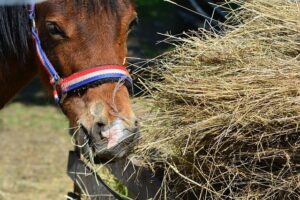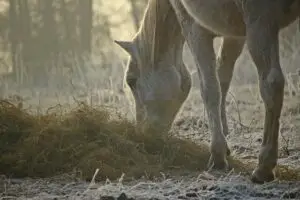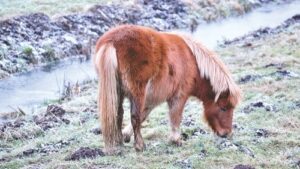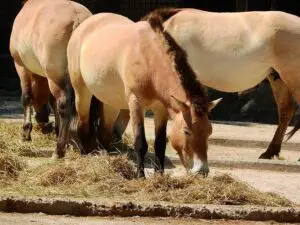Horses require the right amount of nutrients in the proper proportion to enable them to carry out all the tasks and activities they are used for. Since these animals are natural grazers, they spend a lot of time (as much as 16-18 hours a day) grazing on grass pasture and local forages.
So can horses survive on grass alone? While grass is a major part of a horse’s diet, it cannot survive on it alone. You might be wondering why this is so since they basically derive all the nutritional value from their natural environment.
The reason for this is simple. Pasture grass is not always readily available because of seasonal changes which affect their growth and availability. Aside from this reason, grass does not meet all have all the nutritional requirements of the animal.
Fresh grass is a source of long-stem forage, which is the essential requirement in a horse’s diet, but then, since grass is deficient in certain minerals, horses need more than just forage as their diet. Geographical limitations can directly affect the availability of pasture for your horse.
During springtime, when the weather is favorable for the growth of fresh grass, lots of horses get more grazing time than they do in the winter, where conditions are not too pleasant for the growth of grasses. In such periods, hay (which consists of grasses that are cut and dried) and other foods can come in handy.

Nutritional value of grass
Pasture grass is an excellent source of nutrients for your horse as it is high in both digestible energy and crude protein. However, for grass to fulfil all, or most of your horse’s nutritional needs, then the animal has to have ample grazing time.
Horses have a digestive tract that is suited to continuous and light feeding on grass. Therefore, they can spend most of their time grazing in fields if you let them.
Extended grazing has some benefits for horses. One of these benefits is that forage is very important for the gastrointestinal tract of the animal to function very well. However, for your horse to get these nutritional benefits from forage, you have to have a well-managed pasture.
Another benefit of extended grazing is that the field is perfect for your horse to exercise. Exercise also helps horses to maintain a sound digestive function (1).
Unfortunately, most domesticated horses do not have the opportunities to have extended grazing periods and may only be allowed to have only a short time to graze. You’ll therefore, need to supplement their food for them to get the required nutrition.
Seasonal changes play an important role in the nutrients that are available in grasses to meet some of your horse’s nutritional needs. From the nutritional standpoint, most horse owners often wonder if their horses can get the required nutrition from just grass alone or if there is a need to feed their horses with some supplement in addition to the pasture grass they graze on.
These thoughts are not out of place as it is imperative for horse owners to provide the needs of their horses in terms of nutrients. Grass pasture can be an inexpensive means of providing nutrients for your horse quite alright, but is it really enough for it?

Supplementing Your Horse’s Diet With Hay
It is best to feed hay to your horse together with grasses. Hay is best for horses that cannot graze in a pasture at all or for a part of the year due to cold or snow. If you own a small farm and cannot get enough pasture grass for your horses during some parts of the year, you will need to supplement their diets with hay.
Keeping hay in front of your horses allows them to closely mimic their natural grazing behavior while also providing them with nutritional benefits.
Hay is very rich in fibre, which is required by your horse because of its delicate digestive systems to avoid complications. However, it does not include all the nutrition that a horse needs. One of the major things missing from hay is moisture.
Since hay is dried to only 18-20 per cent moisture content, there is a need for a constant supply of fresh water to keep your horse hydrated. Also, because hay is dried, it loses some of its nutritional value (it is deficient in vitamins and minerals).
Since grass lacks certain minerals and hay is lacking in specific vitamins and minerals, horses need more than forage as their diet.
Supplementing your horse’s diet with grain and minerals is a way to solve these deficiencies in vitamins and minerals, respectively. Hay also does not contain enough salt, so you should always make loose salt or a salt lick available to your horse.
Nonetheless, you should be careful with the way you feed concentrates to your horse. You should only feed them to the animal to provide the nutritional requirements that forage lacks. Also, since grains will add extra calories to your horse, you should be careful with how you fed them to your horse.

Tips For Feeding Your Horse With Grains
- Grains should be fed in small amounts rather than in large ones, as excessive feeding of grains can cause complications. Therefore, before feeding a grain meal to your horse, break it into numerous smaller meals and feed it to the animal at intervals during the day.
- To stop your horse from bolting its food, add chaff to the grain feed or make use of slow feeders.
- Try to avoid feeding the animal molasses and instead, give low starch and natural grains to it. You may give it beet pulp as this is better for its gastrointestinal tract.
- Allow the animal freedom to feed on pasture.
- Grains may have some adverse effects on the hindgut of horses. Therefore, you should ensure that you give your horse extra digestive sustenance to help counteract the negative effect of the grain.
The type of job your horse does and the state of the animal also plays a role in deciding if you should place it on a diet of grass/hay or grain supplements. Spring pasture will usually provide the major nutrients required by horses that have just become pregnant, ailing, and mature horses. However, the animal has to have ample time for grazing. You can then give it only a mineral supplement in addition.

For athletic horses, pregnant horses that are in the last trimester, breastfeeding horses and developing horses, supplements are a must. This is because grass, no matter how quality it is, will not serve or fulfil all the nutritional requirements of the animal.
If these horses are to grow, develop or perform their tasks well, you’ll need to feed them some supplements (preferably grains). It is especially important to feed supplements to horses when pasture grass is not available or is limited like during winter.
Final Thoughts on Can Horses Survive On Grass Alone
Pasture grass is necessary as a primary component of every horse’s diet, as it is essential for the proper functioning of their digestive system. Due to seasonal changes, other options like hay and concentrates should be used in their diets as replacements.
When pasture supply is in abundance (such as in spring and fall), you can use grass to replace hay and also reduce the number of concentrates that you feed to your horse.
You should also provide mineral supplements for your horse as both grass and hay are deficient of them. Once you provide all the food that the horse needs in the right proportion for it, you will have a healthy and happy horse.
Glossary
- Ten Ways to Optimize Horse Digestive System (Link)

